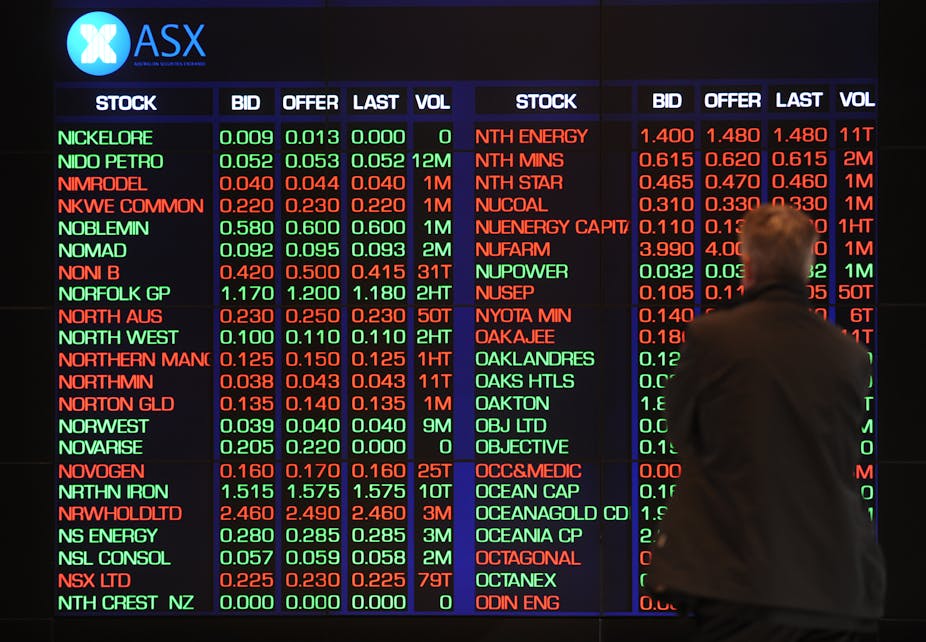Former Gunns chairman John Gay is facing insider trading charges after he allegedly sold more than $3 million worth of the beleaguered timber company’s shares just months before its share price plunged due to poor financial performance.
Sydney University senior lecturer in corporate and business law Juliette Overland explains the significance of the case and the challenges is presents to Australia’s insider-trading laws.
How does this case compare with other insider trading cases in terms of the scale of the alleged offence and the profile of the person involved?
At this stage, it has only been reported that this individual has been charged with insider trading, so not a lot of information is yet known. But this case seems to rate quite highly on both counts. It has been reported that the net profit on the trading was over $3 million, which is significant. Cases have been brought in the past over much lower amounts, such as Rene Rivkin’s case in which the insider trading resulted in profit of only a few thousand dollars.
This is also a very high-profile individual, more likely to be known to a large number of Australians than in many previous cases, which have not always involved senior people within organisations.
The particular issue for directors of listed companies is that there are a number of additional rules they must abide by, in addition to insider-trading prohibitions that apply to everybody.
These include share trading policies, which every listed company must have, that restrict the times at which directors and other senior employees can trade.

These policies usually have block-out periods, or “closed” periods as the ASX now calls them, in which directors and senior employees are not permitted to trade because they are likely to be in possession of sensitive information at particular times of the year.
The ASX also has to be notified within five business days of any share trades by directors of listed companies.
It has been reported that a spokeperson for Gunns has stated that the relevant trading took place at a time when directors were permitted to trade, meaning it was not during one of Gunns’ closed periods.
But even during times when directors are permitted to buy or sell shares under a trading policy, they are still prohibited if they possess inside information.
On the basis of what has been reported, how likely is it that ASIC will be able to begin criminal proceedings and potentially see a criminal conviction in this case?
The fact that there are reports of him being “charged” with insider trading makes it sound as if ASIC has already decided to go ahead with criminal rather than civil proceedings.
ASIC may have already successfully made arrangements with the Department of Public Prosecutions to bring criminal proceedings.
We don’t tend to use the word “charged” for civil actions.
One of the issues that arises with criminal proceedings is that there is a higher burden of proof. The prosecution has to prove beyond reasonable doubt that the elements of the offence are made out.
In civil proceedings, there is a lower burden of proof. It only needs to be proved on the balance of probabilities – which essentially means that it is more likely than not that insider trading has occurred.
One of the key elements of insider trading is knowledge, but it also must be proved that the person knew the information wasn’t publicly available and that it was likely to affect the price of shares, and these are matters hard to prove beyond reasonable doubt.
Even though Australian law no longer makes any practical distinction between different types of insiders, a director of a listed company would be regarded by many as a “true insider”.
In other words, these are people who work within a company, have access to a range of information that is not publicly available, and generally have it in advance of the general public and the market. The insider trading laws, together with the ASX Listing Rules, are designed to ensure these people aren’t able to misuse information they can access, for their own benefit.
What kind of potential penalty could we expect if there is a criminal conviction in this case?
Within the last year the sentences for insider trading have been significantly increased – this is one of the initiatives that Chris Bowen achieved when he was Minister for Financial Services.
He wanted to significantly increase the maximum penalties for insider trading so that there would be a greater deterrent effect.
Individuals can now face a jail term of up to ten years, up from a previous maximum of five years. The maximum fine for every count of insider trading has been increased from $220,000 to $495,000.
However, the real question is, will anything like this ever be imposed?
There are principles of consistency and precedent in sentencing, which aim to ensure that sentences are relative and comparable to those that have been given to other offenders in the past. The deterrent factor is only one of a number of factors that need to be considered.
The highest sentence given in the past is a jail term of four and a half years to John Hartman, who was sentenced prior to the implementation of the new maximum (although that sentence is currently being appealed).
If a director of a large listed company was found guilty of insider trading in shares in that company, their status as a “true insider” could be expected to indicate that they would face a heavier sentence than some other traders, particularly somebody outside of the company who simply came across the information in a manner unconnected with their employment.
Of course, there are many issues to be addressed here before any potential sentence might become relevant, so it will be interesting to see how this case plays out.

